Lexus IS250 2014 Owner's Manual
Manufacturer: LEXUS, Model Year: 2014, Model line: IS250, Model: Lexus IS250 2014Pages: 588, PDF Size: 98.77 MB
Page 421 of 588
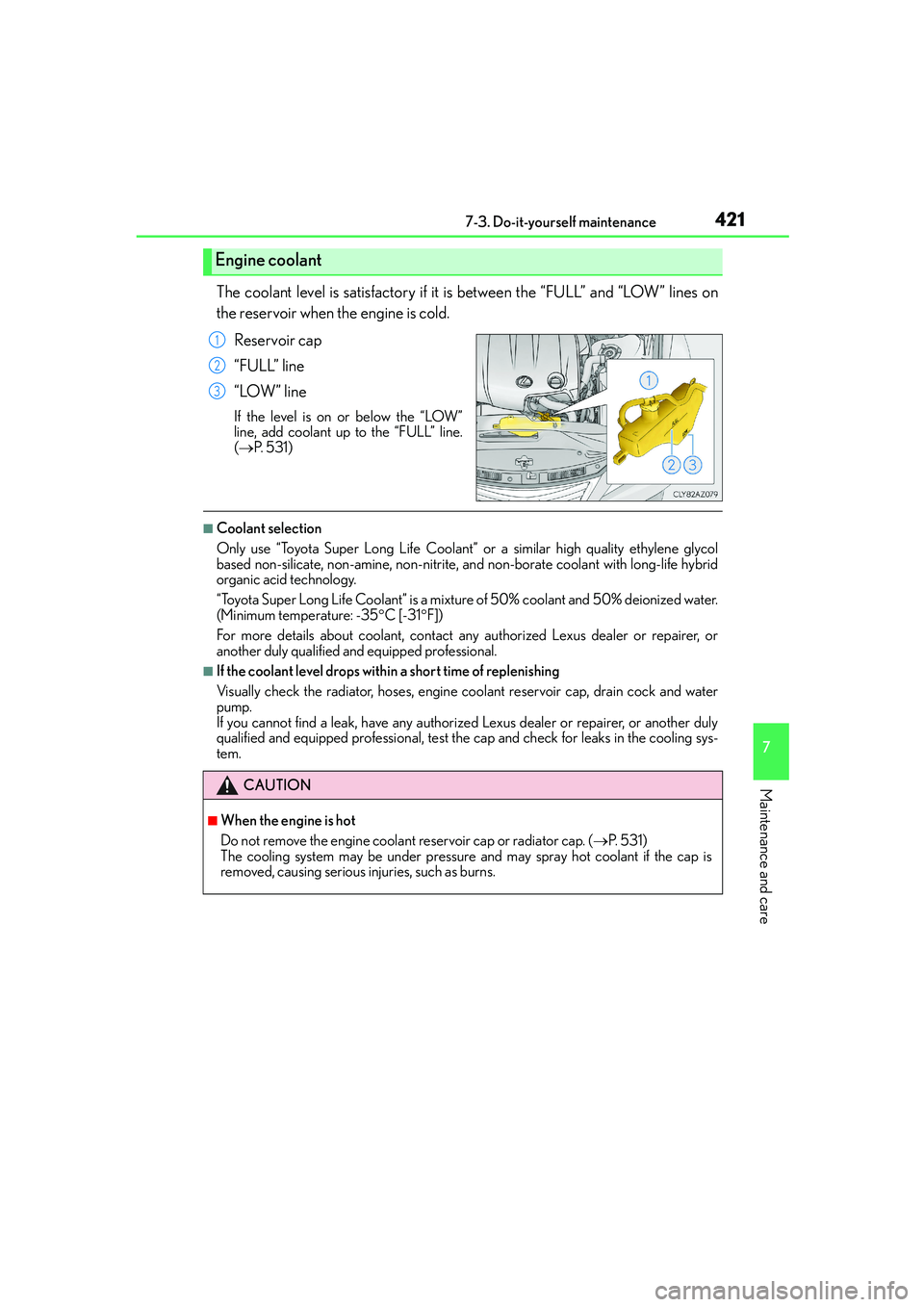
4217-3. Do-it-yourself maintenance
7
Maintenance and care
IS250_EE(OM53C51E)
The coolant level is satisfactory if it is between the “FULL” and “LOW” lines on
the reservoir when the engine is cold.
Reservoir cap
“FULL” line
“LOW” line
If the level is on or below the “LOW”
line, add coolant up to the “FULL” line.
(→P. 5 3 1 )
■Coolant selection
Only use “Toyota Super Long Life Coolant” or a similar high quality ethylene glycol
based non-silicate, non-amine, non-nitrite, and non-borate coolant with long-life hybrid
organic acid technology.
“Toyota Super Long Life Coolant” is a mixture of 50% coolant and 50% deionized water.
(Minimum temperature: -35°C [-31°F])
For more details about coolant, contact any authorized Lexus dealer or repairer, or
another duly qualified and equipped professional.
■If the coolant level drops within a short time of replenishing
Visually check the radiator, hoses, engine coolant reservoir cap, drain cock and water
pump.
If you cannot find a leak, have any authorized Lexus dealer or repairer, or another duly
qualified and equipped professional, test the cap and check for leaks in the cooling sys-
tem.
Engine coolant
1
2
3
CAUTION
■When the engine is hot
Do not remove the engine coolant reservoir cap or radiator cap. (→P. 5 3 1 )
The cooling system may be under pressure and may spray hot coolant if the cap is
removed, causing serious injuries, such as burns.
Page 422 of 588

4227-3. Do-it-yourself maintenance
IS250_EE(OM53C51E)
Check the radiator and condenser and clear away any foreign objects.
If either of the above parts is extremely dirty or you are not sure of their condi-
tion, have your vehicle inspected by any authorized Lexus dealer or repairer, or
another duly qualified and equipped professional.
Check the battery as follows.
■Caution symbols
The meaning of each caution symbol on the top of the battery are as follows:
NOTICE
■When adding coolant
Coolant is neither plain water nor straight antifreeze. The correct mixture of water and
antifreeze must be used to provide proper lubrication, corrosion protection and cool-
ing. Be sure to read the antifreeze or coolant label.
■If you spill coolant
Be sure to wash it off with water to prevent it from damaging parts or paint.
Radiator and condenser
CAUTION
■When the engine is hot
Do not touch the radiator or condenser as they may be hot and cause serious injuries,
such as burns.
Battery
No smoking, no naked
flames, no sparksBattery acid
Shield eyesNote operating instructions
Keep away from childrenExplosive gas
Page 423 of 588
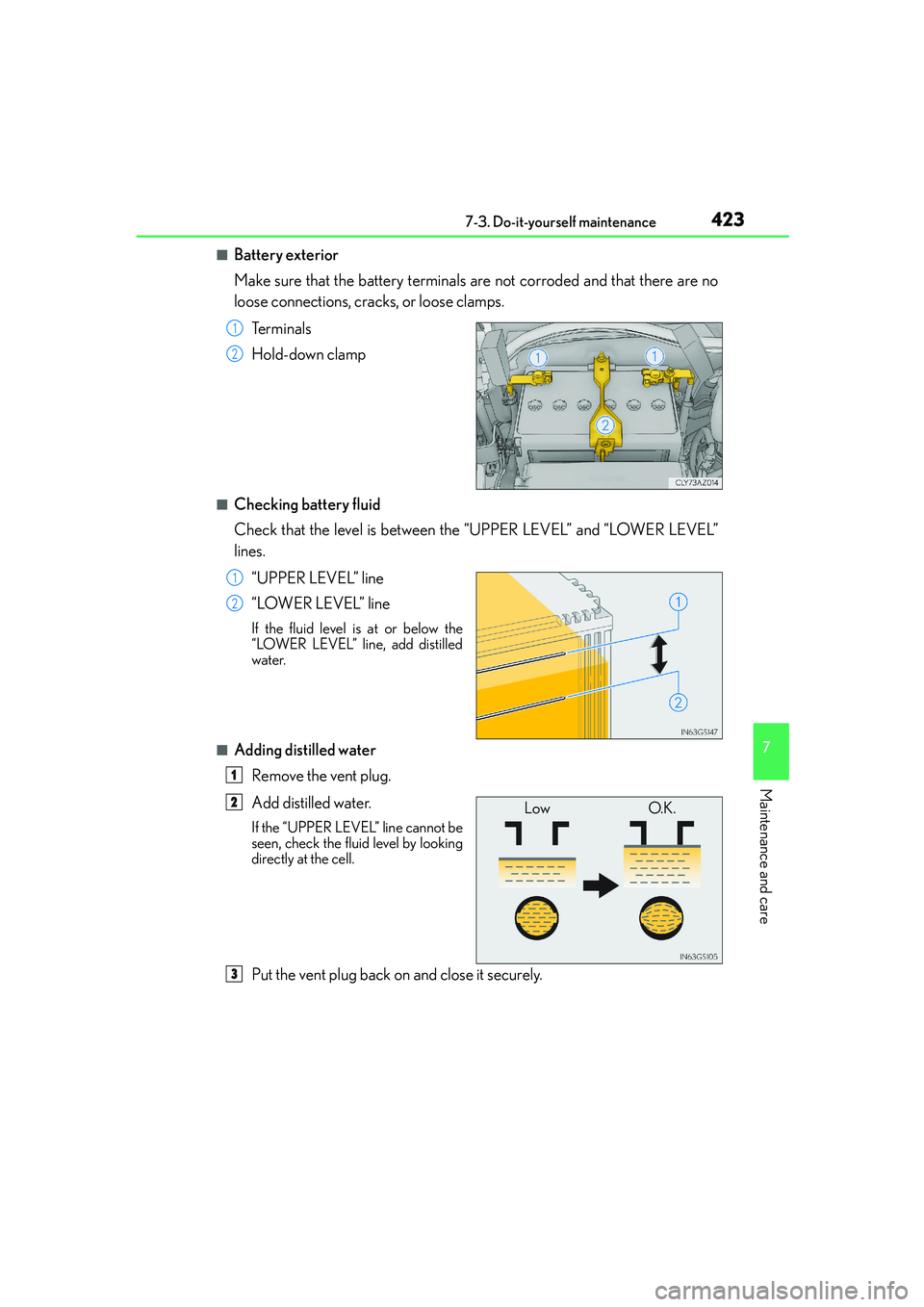
4237-3. Do-it-yourself maintenance
7
Maintenance and care
IS250_EE(OM53C51E)
■Battery exterior
Make sure that the battery terminals are not corroded and that there are no
loose connections, cracks, or loose clamps.
Te r m i n a l s
Hold-down clamp
■Checking battery fluid
Check that the level is between the “UPPER LEVEL” and “LOWER LEVEL”
lines.
“UPPER LEVEL” line
“LOWER LEVEL” line
If the fluid level is at or below the
“LOWER LEVEL” line, add distilled
water.
■Adding distilled water
Remove the vent plug.
Add distilled water.
If the “UPPER LEVEL” line cannot be
seen, check the fluid level by looking
directly at the cell.
Put the vent plug back on and close it securely.
1
2
1
2
1
Low O.K.2
3
Page 424 of 588

4247-3. Do-it-yourself maintenance
IS250_EE(OM53C51E)
■Before recharging
When recharging, the battery produces hydrogen gas which is flammable and explosive.
Therefore, observe the following before recharging:
●If recharging with the battery installed on the vehicle, be sure to disconnect the ground
cable.
●Make sure the power switch on the charger is off when connecting and disconnecting
the charger cables to the battery.
■After recharging/reconnecting the battery
The engine may not start. Follow the procedure below to initialize the system.
Shift the shift lever to P.
Open and close any of the doors.
Restart the engine.
●Unlocking the doors using the smart entry & start system may not be possible immedi-
ately after reconnecting the battery. If this happens, use the wireless remote control or
the mechanical key to lock/unlock the doors.
●Start the engine with the engine switch in ACCESSORY mode. The engine may not
start with the engine switch turned off. However, the engine will operate normally from
the second attempt.
●The engine switch mode is recorded by the vehicle. If the battery is disconnected and
reconnected, the vehicle will return the engine switch mode to the status it was in
before the battery was disconnected. Make sure to turn off the engine before discon-
necting the battery. Take extra care when connecting the battery if the engine switch
mode prior to the battery being disconnected is unknown.
If the engine will not start even after multiple attempts at all the methods contact any
authorized Lexus dealer or repairer, or another duly qualified and equipped professional.
1
2
3
Page 425 of 588
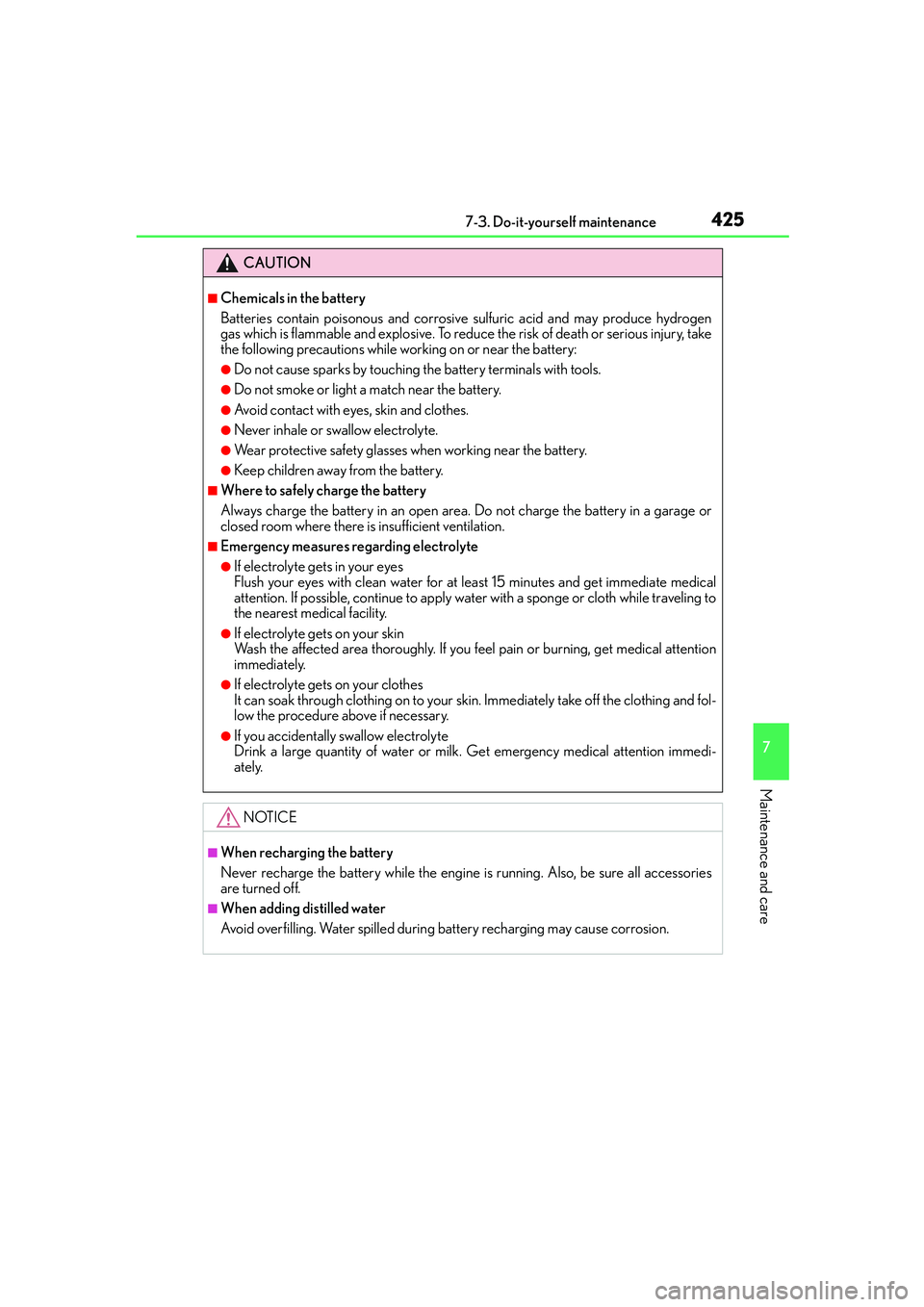
4257-3. Do-it-yourself maintenance
7
Maintenance and care
IS250_EE(OM53C51E)
CAUTION
■Chemicals in the battery
Batteries contain poisonous and corrosive sulfuric acid and may produce hydrogen
gas which is flammable and explosive. To reduce the risk of death or serious injury, take
the following precautions while working on or near the battery:
●Do not cause sparks by touching the battery terminals with tools.
●Do not smoke or light a match near the battery.
●Avoid contact with eyes, skin and clothes.
●Never inhale or swallow electrolyte.
●Wear protective safety glasses when working near the battery.
●Keep children away from the battery.
■Where to safely charge the battery
Always charge the battery in an open area. Do not charge the battery in a garage or
closed room where there is insufficient ventilation.
■Emergency measures regarding electrolyte
●If electrolyte gets in your eyes
Flush your eyes with clean water for at least 15 minutes and get immediate medical
attention. If possible, continue to apply water with a sponge or cloth while traveling to
the nearest medical facility.
●If electrolyte gets on your skin
Wash the affected area thoroughly. If you feel pain or burning, get medical attention
immediately.
●If electrolyte gets on your clothes
It can soak through clothing on to your skin. Immediately take off the clothing and fol-
low the procedure above if necessary.
●If you accidentally swallow electrolyte
Drink a large quantity of water or milk. Get emergency medical attention immedi-
ately.
NOTICE
■When recharging the battery
Never recharge the battery while the engine is running. Also, be sure all accessories
are turned off.
■When adding distilled water
Avoid overfilling. Water spilled during battery recharging may cause corrosion.
Page 426 of 588

4267-3. Do-it-yourself maintenance
IS250_EE(OM53C51E)
If any washer does not work or the
warning message appears on the multi-
information display, the washer tank
may be empty. Add washer fluid.
Washer fluid
CAUTION
■When adding washer fluid
Do not add washer fluid when the engine is hot or running as washer fluid contains
alcohol and may catch fire if spilled on the engine etc.
NOTICE
■Do not use any fluid other than washer fluid
Do not use soapy water or engine antifreeze instead of washer fluid.
Doing so may cause streaking on the vehicle’s painted surfaces.
■Diluting washer fluid
Dilute washer fluid with water as necessary.
Refer to the freezing temperatures listed on the label of the washer fluid bottle.
Page 427 of 588
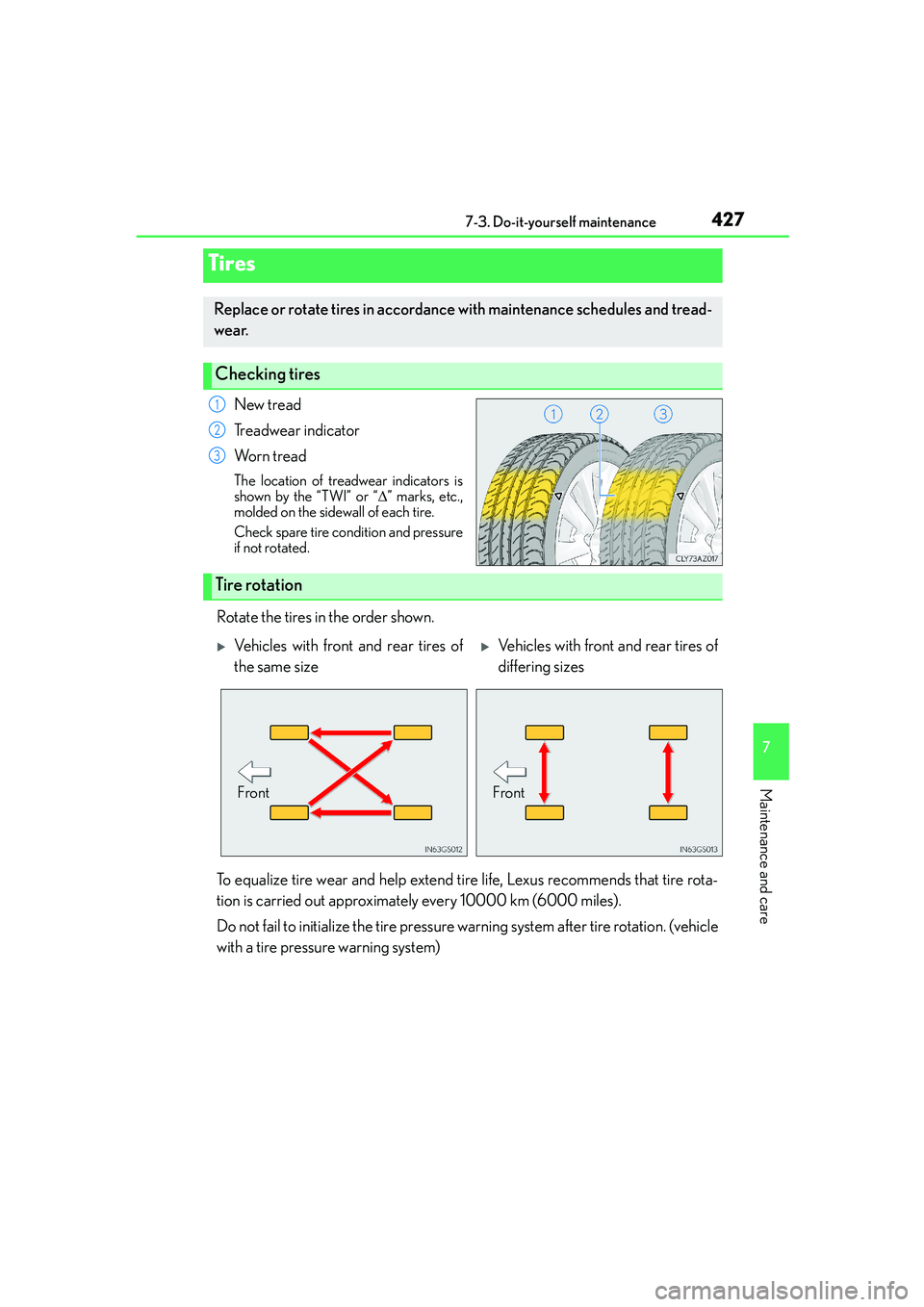
4277-3. Do-it-yourself maintenance
7
Maintenance and care
IS250_EE(OM53C51E)
New tread
Treadwear indicator
Wo r n t r e a d
The location of treadwear indicators is
shown by the “TWI” or “∆” marks, etc.,
molded on the sidewall of each tire.
Check spare tire condition and pressure
if not rotated.
Rotate the tires in the order shown.
To equalize tire wear and help extend tire life, Lexus recommends that tire rota-
tion is carried out approximately every 10000 km (6000 miles).
Do not fail to initialize the tire pressure warning system after tire rotation. (vehicle
with a tire pressure warning system)
Tires
Replace or rotate tires in accordance with maintenance schedules and tread-
wear.
Checking tires
1
2
3
Tire rotation
�XVehicles with front and rear tires of
the same size�XVehicles with front and rear tires of
differing sizes
FrontFront
Page 428 of 588
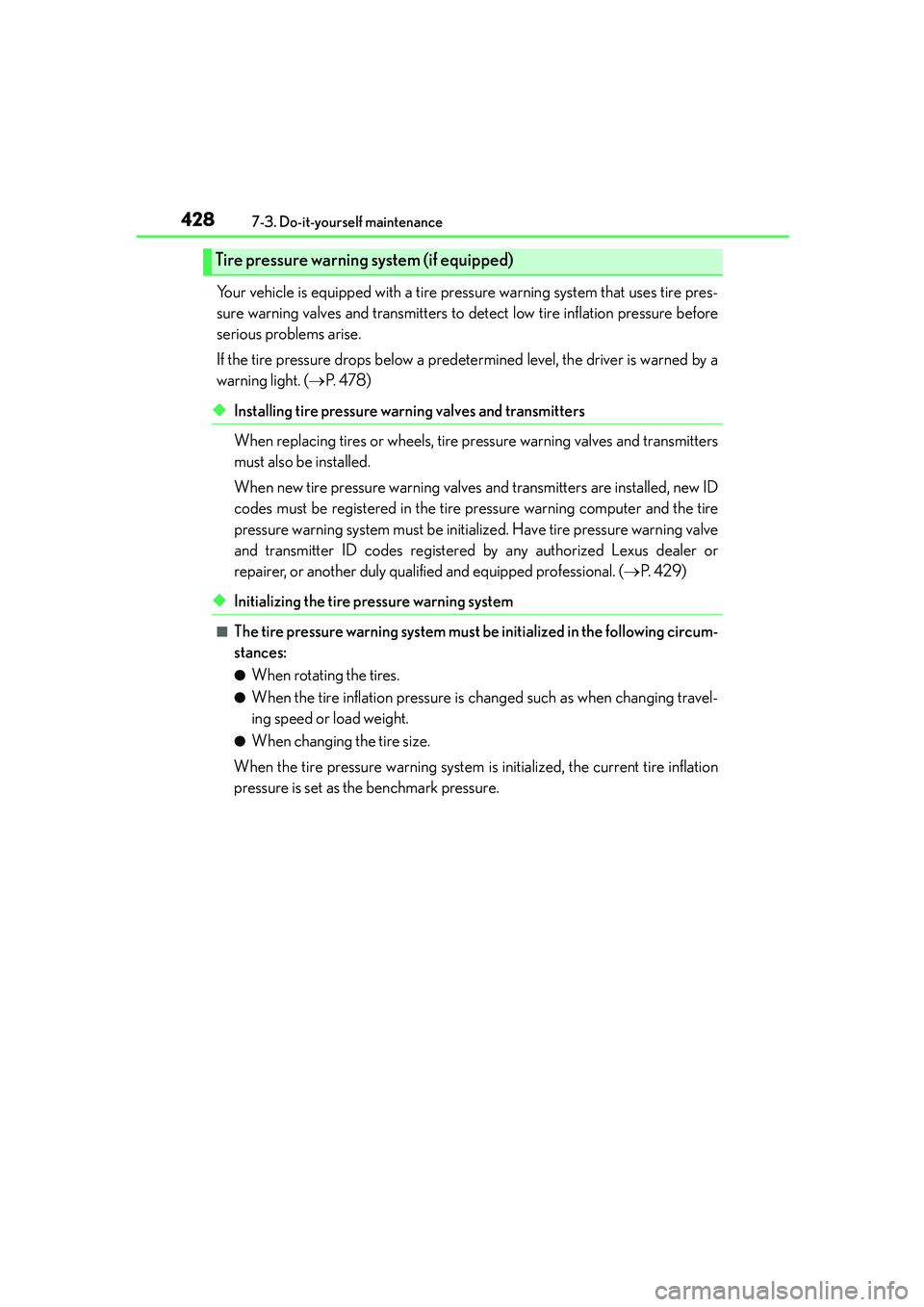
4287-3. Do-it-yourself maintenance
IS250_EE(OM53C51E)
Your vehicle is equipped with a tire pressure warning system that uses tire pres-
sure warning valves and transmitters to detect low tire inflation pressure before
serious problems arise.
If the tire pressure drops below a predetermined level, the driver is warned by a
warning light. (→P. 4 7 8 )
◆Installing tire pressure warning valves and transmitters
When replacing tires or wheels, tire pressure warning valves and transmitters
must also be installed.
When new tire pressure warning valves and transmitters are installed, new ID
codes must be registered in the tire pressure warning computer and the tire
pressure warning system must be initialized. Have tire pressure warning valve
and transmitter ID codes registered by any authorized Lexus dealer or
repairer, or another duly qualified and equipped professional. (→P. 4 2 9 )
◆Initializing the tire pressure warning system
■The tire pressure warning system must be initialized in the following circum-
stances:
●When rotating the tires.
●When the tire inflation pressure is changed such as when changing travel-
ing speed or load weight.
●When changing the tire size.
When the tire pressure warning system is initialized, the current tire inflation
pressure is set as the benchmark pressure.
Tire pressure warning system (if equipped)
Page 429 of 588
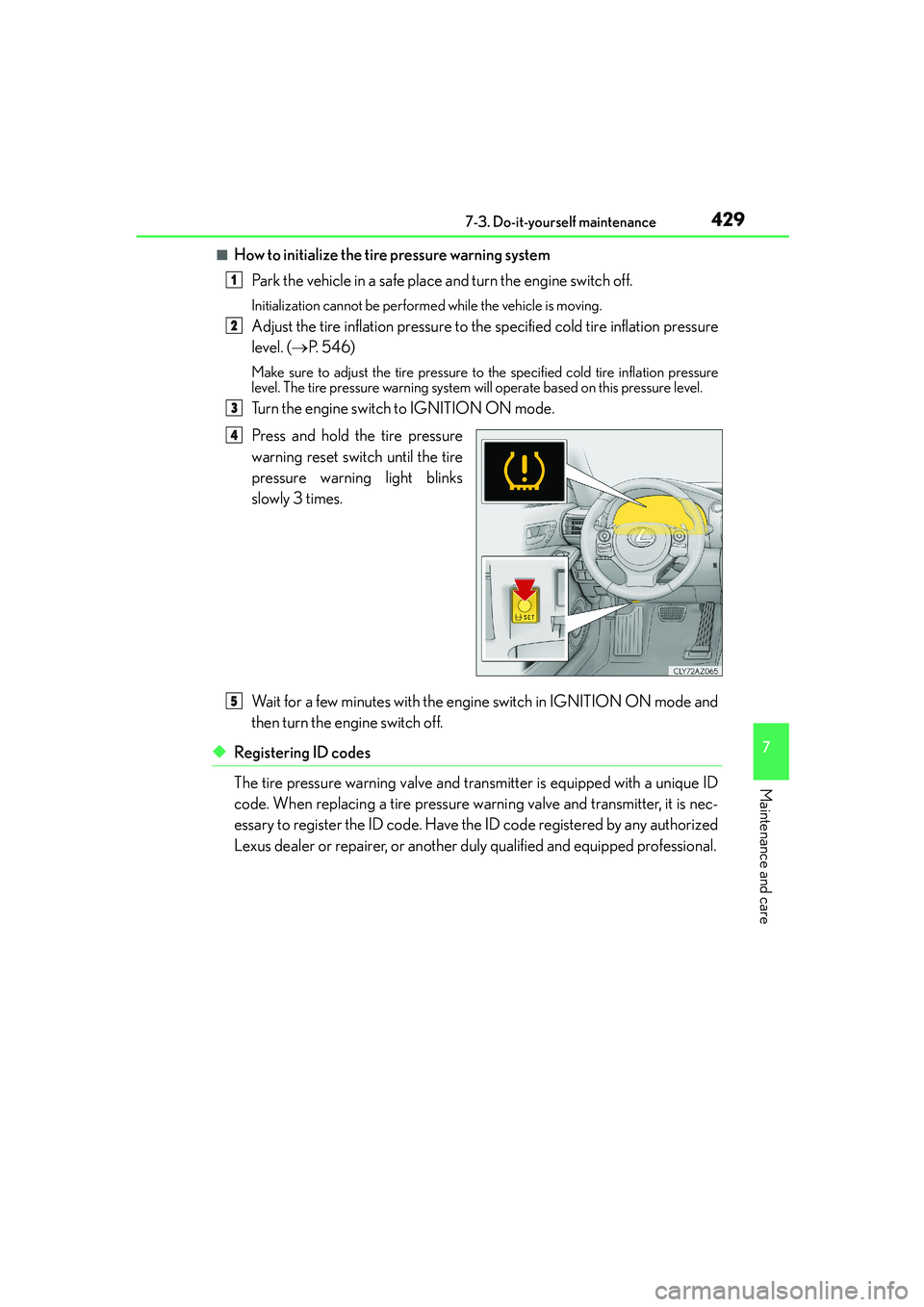
4297-3. Do-it-yourself maintenance
7
Maintenance and care
IS250_EE(OM53C51E)
■How to initialize the tire pressure warning system
Park the vehicle in a safe place and turn the engine switch off.
Initialization cannot be performed while the vehicle is moving.
Adjust the tire inflation pressure to the specified cold tire inflation pressure
level. (→P. 5 4 6 )
Make sure to adjust the tire pressure to the specified cold tire inflation pressure
level. The tire pressure warning system will operate based on this pressure level.
Turn the engine switch to IGNITION ON mode.
Press and hold the tire pressure
warning reset switch until the tire
pressure warning light blinks
slowly 3 times.
Wait for a few minutes with the engine switch in IGNITION ON mode and
then turn the engine switch off.
◆Registering ID codes
The tire pressure warning valve and transmitter is equipped with a unique ID
code. When replacing a tire pressure warning valve and transmitter, it is nec-
essary to register the ID code. Have the ID code registered by any authorized
Lexus dealer or repairer, or another duly qualified and equipped professional.
1
2
3
4
5
Page 430 of 588
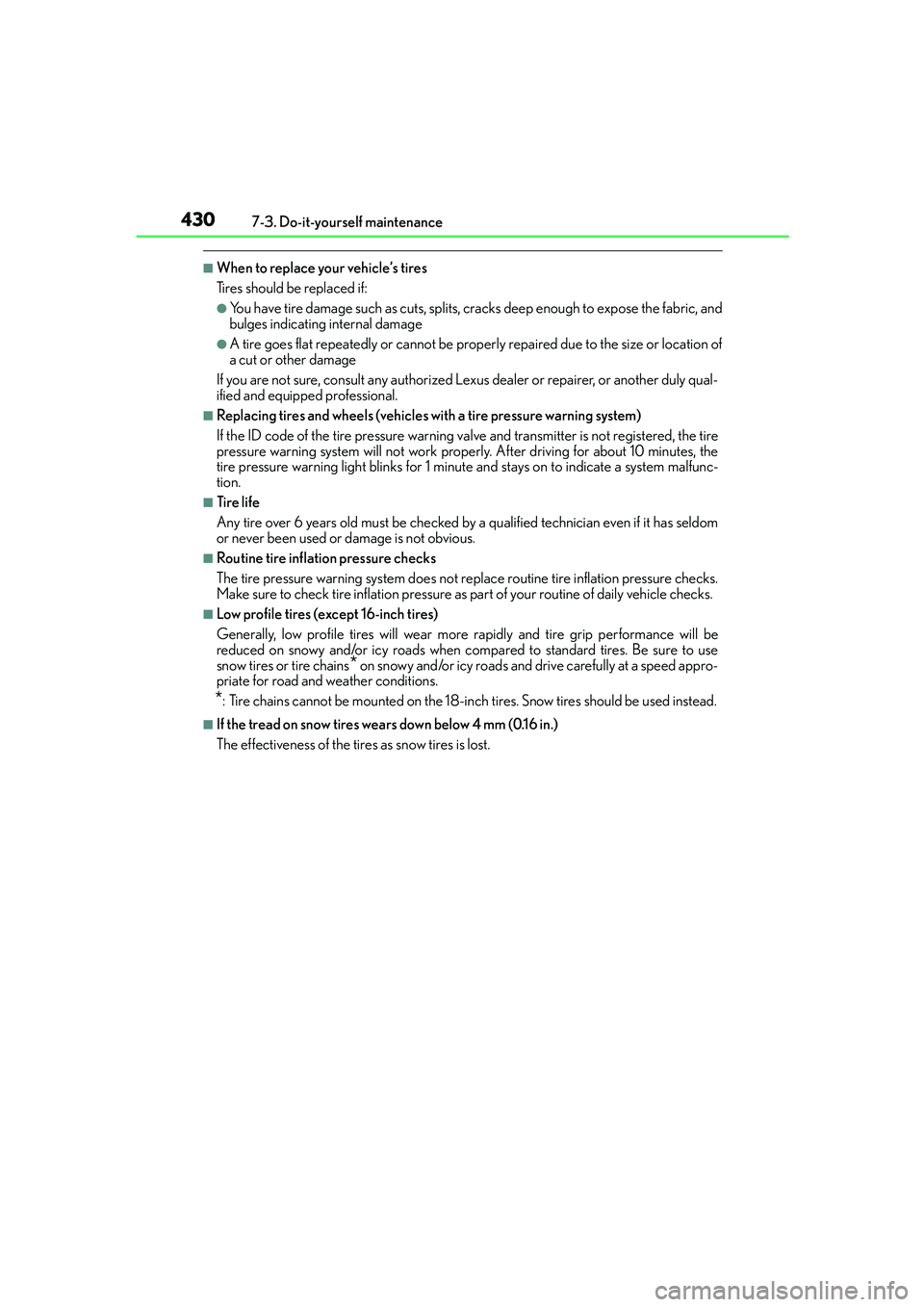
4307-3. Do-it-yourself maintenance
IS250_EE(OM53C51E)
■When to replace your vehicle’s tires
Tires should be replaced if:
●You have tire damage such as cuts, splits, cracks deep enough to expose the fabric, and
bulges indicating internal damage
●A tire goes flat repeatedly or cannot be properly repaired due to the size or location of
a cut or other damage
If you are not sure, consult any authorized Lexus dealer or repairer, or another duly qual-
ified and equipped professional.
■Replacing tires and wheels (vehicles with a tire pressure warning system)
If the ID code of the tire pressure warning valve and transmitter is not registered, the tire
pressure warning system will not work properly. After driving for about 10 minutes, the
tire pressure warning light blinks for 1 minute and stays on to indicate a system malfunc-
tion.
■Tire life
Any tire over 6 years old must be checked by a qualified technician even if it has seldom
or never been used or damage is not obvious.
■Routine tire inflation pressure checks
The tire pressure warning system does not replace routine tire inflation pressure checks.
Make sure to check tire inflation pressure as part of your routine of daily vehicle checks.
■Low profile tires (except 16-inch tires)
Generally, low profile tires will wear more rapidly and tire grip performance will be
reduced on snowy and/or icy roads when compared to standard tires. Be sure to use
snow tires or tire chains
* on snowy and/or icy roads and drive carefully at a speed appro-
priate for road and weather conditions.
*: Tire chains cannot be mounted on the 18-inch tires. Snow tires should be used instead.
■If the tread on snow tires wears down below 4 mm (0.16 in.)
The effectiveness of the tires as snow tires is lost.